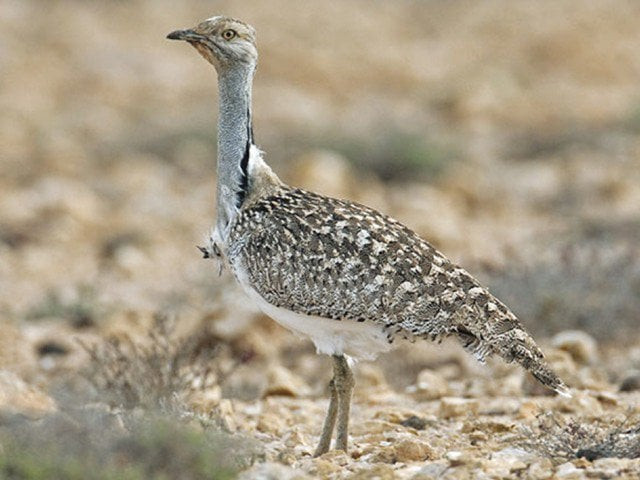Into the wild: 220 captive-bred houbara bustards to be released
The birds have been bred in Abu Dhabi, but the specie is native to Pakistan

PHOTO: AFP
The Houbara Foundation International Pakistan will soon release 220 houbara bustards, bred in Abu Dhabi, in the Punjab with the idea to augment the specie’s population in Pakistan. The birds are native to Pakistan.
This was decided at a meeting between Punjab Wildlife and Parks Director General Khalid Ayaz Khan and Houbara Foundation International Pakistan President Brig (r) Mukhtar Ahmed on Monday. The birds have been donated by the International Fund for Houbara Conservation based in Abu Dhabi, UAE. The organisation had released 600 houbara bustards in Pakistan in March 2015.
The Wildlife DG was told that the birds had been examined and certified fit for air travel. Khan said the birds will be examined once again before they travel to Pakistan. “Unfit houbara bustards will not be brought to Pakistan.”
Ayaz Khan, on behalf of the Wildlife and Parks Department, and Brig (r) Ahmed, on behalf of the Abu Dhabi establishment, exchanged export and import permits, and necessary NOCs. Khan said he hoped that most of the birds would acclimatise in time and breed so that the houbara bustard population in Pakistan could increase.
Brig (r) Ahmed said the organisation had made massive strides in their houbara bustard breeding programme. He said a record number of houbara bustards had been born in their state-of-the-art breeding centres. He said the release of captive-bred birds in Pakistan could help sustain existing wild population.
He said 979 houbara bustards were born in their breeding centres in 2003. The number had risen to 40,011 by 2013. Brig (r) Ahmed said more than 200,000 houbara bustards had been bred under the organisation’s breeding programme.
He said the International Fund was close to achieving its goal of breeding up to 50,000 houbara bustards every year. He said that the birds which would be released in the province had been individually tagged with identification rings.
Some select birds had also been tagged with satellite transmitters for scientists to monitor them after their release into the wild. The scientists will track and record their movement, habitat preferences and their ability to breed. After the release, data will be generated twice a week, in order to detect movements and breeding behaviours. Their locations will be communicated to the Houbara Foundation International Pakistan for field validation and further investigation.
Ayaz Khan and Brig (r) Ahmed promised their full cooperation in this regard.
Published in The Express Tribune, December 29th, 2015.



















COMMENTS
Comments are moderated and generally will be posted if they are on-topic and not abusive.
For more information, please see our Comments FAQ